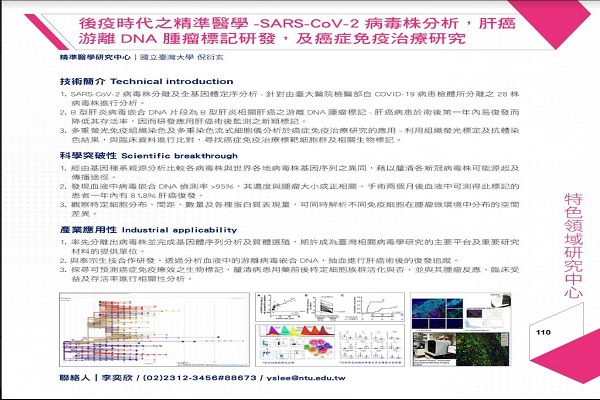| Technical Name | Precision Medicine in Post-pandemic Era-SARS-CoV-2 Virus Strain Analysis, Novel ctDNA Marker for HCC Detection, and Cancer Immunotherapy Study | ||
|---|---|---|---|
| Project Operator | Center of Precision Medicine | ||
| Project Host | 倪衍玄 | ||
| Summary | 1. SARS-CoV-2 Isolation and Whole-genome Sequencing Analysis-The whole-genome sequencing was performed to examine 28 SARS-CoV-2 virus strains from patient tissue samples isolated by NTUH Department of Laboratory Medicine. 2. Vh-chimera DNA as a New ctDNA Marker for Detecting the Existence of HBV-related HCC-About one-third of patients suffer tumor recurrence within the first year after surgical resection of HCC and their overall survival is compromised. The study identified vh-chimera DNA as a novel ctDNA marker for HBV-related HCC detection. |
||
| Scientific Breakthrough | 1. The research compared the difference between virus sequences obtained from Taiwan and those from around the world using phylogenetic analysis to clarify the possible origins and transmissions of individual virus strains. 2. The results showed HBV integrations in >95% of HBV-related HCC patients and the copy number of vh-chimera DNA in plasma correlated with tumor size. Among patients with the ctDNA marker in plasma collected 2 months after surgery, 81.8% suffered from HCC recurrence within one year. 3. By observing distribution, distance, and numbers of certain cells as well as their protein expression, the techniques allow us to elucidate the special difference of different immune cells in tumor microenvironment. |
||
| Industrial Applicability | 1. The research group was one of the firsts to isolate virus strains and completed sequence analysis. The obtained results have prepared us to become a major platform and material provider in relative virus studies in Taiwan. 2. By collaborating with TCM Biotech International Crop. , the study will be applied to quantify vh-chimera DNA in plasma samples and detect residual or recurrent HCC. 3. The techniques are utilized to discover predictive biomarkers for cancer immunotherapy efficacy and explicate certain cellular activation in cancer patients before and after receiving immunotherapy. Correlation analysis can be further performed with tumor response, clinical benefit, and overall survival. |
||
| Matching Needs | 如對技術有興趣,歡迎與我聯繫,謝謝! |
||
| Report |
後疫時代之精準醫學-SARS-CoV-2病毒株分析,肝癌游離DNA腫瘤標記研發,及癌症免疫治療研究國立臺灣大學
基因體暨精準醫學研究中心
中心成立宗旨與實際貢獻
本研究中心成立於2014年係以醫學校區基因體暨精準醫學為學術研究主軸,藉由各主題核心實驗室專業研發服務平台,整合校內跨學院系所研究單位,聯合國內外相關頂尖優秀學術機構,共同開展醫學研究及醫事技術相關跨領域學術或產業合作,同時為基因體醫學或轉譯醫學奠定研究基礎以延伸應用於臨床治療,進以符合精準醫學醫療研發精神,透過生物醫學檢測結合大數據分析,為感染症、逆境醫學及癌症相關疾病之個別病患尋求最適宜個人化治療方式。
本中心主要研究理念為基於科學創新精神提升醫學研究,結合新穎診斷治療與藥物疫苗方案,有效控制或根除一種以上傳染性疾病,探究新穎醫學知識研發醫事專利以發展前瞻醫務專業,並且掌握逆境反應機制對疾病所產生影響,為感染症、逆境醫學或癌症相關疾患完善免疫醫療照護制度,進而拓展本中心學術研發國際合作能見度與可能性,帶領臺灣下一代醫務人才開創世界新局,參與世界防疫事務以提升臺灣全球地位。
2020 科技成果展說明
自從2020年初COVID-19新型冠狀病毒疫情爆發以來,感染症研究小組率先分離出該類型病毒株,完成基因序列分析及質體選殖,並積極協助參與病毒快篩(RT-PCR)與傳染控制,相關重大技術研發詳細說明敬請參照所列附圖:
|
||
- yslee@ntu.edu.tw














